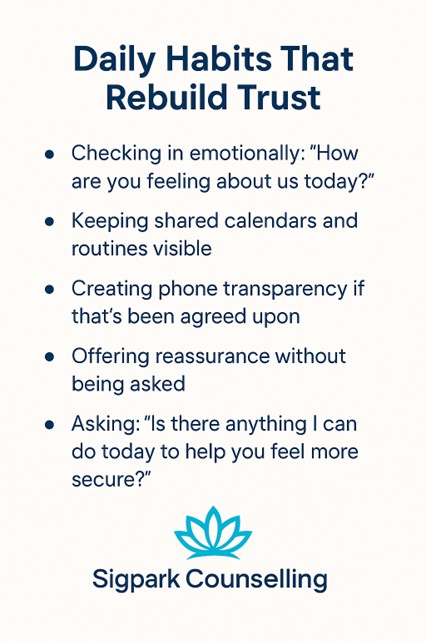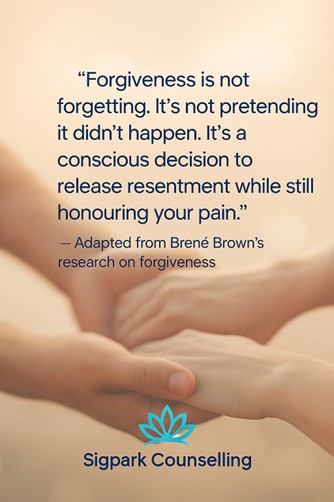Rebuilding Trust After Infidelity: How to Heal, Reconnect, and Move Forward—Together
Acknowledging the Pain of Betrayal
When trust is broken in a relationship—especially through infidelity—it can feel like the ground has dropped out from beneath you.
Maybe you’ve just discovered the betrayal and feel numb, angry, and completely lost. Or maybe you’re the one who broke the trust, filled with guilt and unsure if things can ever be repaired.
Wherever you are in this moment, one thing is certain: this hurts.
Infidelity is one of the deepest wounds a relationship can endure. It often shatters not just trust, but safety, stability, and the belief that you and your partner are on the same team.
At Sigpark Counselling, we understand how complex this pain is. It’s grief. It’s rage. It’s confusion. It’s the constant wondering:
“Can we come back from this?”
And here’s the truth:
Some couples don’t. They go their separate ways—and that’s a valid choice.
But many others do choose to stay.
They choose to rebuild.
Not because it’s easy. But because they see something worth saving—and they’re both willing to do the hard, healing work to get there.
This blog is for those couples. For the ones who are still hurting, still unsure—but still hoping.
In the sections ahead, we’ll walk you through what rebuilding trust actually looks like:
- The emotional aftermath of infidelity
- What healing involves (hint: it’s not just saying “I forgive you”)
- How therapy supports both partners
- What daily trust-building really means
- And when to know it’s time to reach out for help
- Because trust can be broken.
- But it can also be rebuilt—with time, consistency, and compassion.
Let’s start there.
What Infidelity Really Means in a Relationship
It’s not just what happened. It’s what it broke.
When we hear the word “infidelity,” most of us picture a secret affair—late-night texts, hotel rooms, hidden phone calls. But betrayal comes in many forms, and the emotional aftermath isn’t always about the physical act.
Sometimes, it’s emotional infidelity: long, vulnerable conversations with someone outside the relationship that slowly replace connection at home.
Other times, it’s digital: flirty DMs, secret OnlyFans subscriptions, or porn use that crosses boundaries.
And yes, often it is physical—an affair, a one-night stand, or a sexual relationship that was hidden.
But no matter the form, the result is the same:
Trust has been broken. And with it, a sense of safety, stability, and shared reality.
At Sigpark Counselling, we don’t just ask, “What happened?”
We ask, “What did it mean for you?”
Because for one partner, infidelity might feel like abandonment.
For another, it might feel like rejection or not being enough.
And for the one who cheated, there may be deep shame, fear, or confusion about what led to their choices.

Why It Hurts So Much
Infidelity isn’t just about sex or secrecy. It’s about the rupture of emotional trust.
It tells one partner: “I’m not safe here anymore.”
Researchers in relationship psychology explain that betrayal activates the same neurological pathways as physical pain. Your brain perceives it as a threat to survival—especially if this person was your emotional anchor.
Betrayal can trigger:
- Hypervigilance (“Are they hiding something again?”)
- Flashbacks or intrusive thoughts
- Obsessive questioning (“What else don’t I know?”)
- Emotional numbing, shutdown, or rage
- Deep identity shifts (“Was any of this real?”)
This is normal.
You’re not crazy. You’re not overreacting.
You’re dealing with an attachment injury—and those take time, support, and care to heal.
Want to understand more about what betrayal does to your body and brain? This article from the Gottman Institute explains how affairs impact trust at a biological and emotional level.
The good news?
If both partners are willing, this pain—while excruciating—can become the entry point to deeper honesty, emotional clarity, and even a stronger relationship than before.
But it has to be handled with intention.
Is Rebuilding Trust After Infidelity Even Possible?
The answer is yes—but it’s not what you think.
Let’s get this out of the way:
You don’t “get over” infidelity.
You move through it.
Trust isn’t rebuilt with a grand apology. It’s not repaired by promising “It’ll never happen again.” And it’s definitely not restored just because time passes.
Trust is rebuilt in the day-to-day.
In the small, consistent choices that show:
“I see how I hurt you. I’m here. And I’m doing the work.”
So yes—rebuilding trust after infidelity is possible.
Thousands of couples do it. We’ve seen it right here at Sigpark Counselling.
But it requires honesty, transparency, vulnerability, and—most of all—mutual commitment.
What Rebuilding Actually Looks Like
✅ The partner who broke trust must be fully accountable—no minimising, no excuses, no gaslighting.
✅ The hurt partner needs space to ask hard questions, express grief, and not be rushed into forgiveness.
✅ Both partners need to understand why the betrayal happened—not just what happened.
✅ And both need to commit to healing—not just the relationship, but their own emotional patterns, too.
How You Know You Might Be Ready
You don’t need to have all the answers yet. But here are some signs you might be ready to start the rebuilding process:
- You both still want to try
- You’re both willing to be uncomfortable to heal
- The partner who betrayed is ready to be fully transparent
- The hurt partner is open to feeling—rather than numbing or shutting down
- You’re willing to seek help, not go it alone
The first step isn’t trust.
It’s the willingness to rebuild it.
In the next section, we’ll outline the three key stages of healing after betrayal—and why rushing to “forgive and forget” can actually make things worse.

The 3 Stages of Healing After Infidelity
You can’t rebuild trust all at once. You rebuild it in phases.
Rebuilding trust after betrayal is not linear. Some days you’ll feel hopeful—others, you may feel like you’re right back at square one. That’s normal. Healing moves in waves, not straight lines.
At Sigpark Counselling, we guide couples through a structured, trauma-informed process that helps rebuild emotional safety and connection at a sustainable pace.
While every couple’s journey is different, most follow three core stages of healing:
Stage 1: Safety & Stabilization
Goal: Create emotional safety and reduce reactivity
This is where the dust begins to settle. Not everything is forgiven. Not everything is clear. But you’re both committed to slowing things down and not making things worse.
In this stage, couples often:
- Set clear communication boundaries (no yelling, stonewalling, name-calling)
- Establish ground rules for transparency (e.g. device access, whereabouts, check-ins)
- Take intentional space, if needed, to regulate intense emotions
- Start therapy, either individually or together
🟩 Important: The betrayed partner needs space to feel their emotions without being rushed. The partner who betrayed needs to show consistent responsibility, not defensiveness.
Stage 2: Understanding & Processing
Goal: Get to the root of what happened—without getting stuck in blame
Once things are more stable, we begin asking the deeper questions:
- Why did this happen?
- What was going on in the relationship (and in each individual) at the time?
- What emotional needs weren’t being expressed—or heard?
- Was there past trauma, unresolved resentment, or unspoken disconnection?
This is the phase where both people begin to truly understand the emotional context behind the betrayal—not to excuse it, but to explain it.
It’s also the phase where grief and anger often peak. That’s okay. It means you’re actually processing.
In therapy, we help couples safely:
- Revisit painful moments without reliving them
- Learn how to respond with empathy, not reactivity
- Explore attachment dynamics and unmet emotional needs
Stage 3: Reconnection & Rebuilding
Goal: Create a new foundation based on truth, safety, and shared values
Here’s where the healing turns forward.
In this phase, you’re not just surviving the affair—you’re working on becoming a different kind of couple: one built on radical honesty, mutual respect, emotional attunement, and healthy boundaries.
This might include:
- Weekly check-ins to share wins, fears, and progress
- Rebuilding physical and emotional intimacy (at a pace that feels safe)
- Co-creating rituals of connection
- Exploring forgiveness (not forced, but freely chosen)
You may still have triggers. You may still have hard days. But trust is being rebuilt—not through words, but through consistent actions.
🧠 Want to understand the research behind this process?
Read more about Emotionally Focused Therapy (EFT) and the stages of healing
How Therapy Supports Both Partners
Most couples who try to work through infidelity alone get stuck.
They keep looping the same arguments.
They avoid the real conversations.
Or worse—they stuff everything down and pretend things are “fine,” while the emotional wound stays wide open underneath.
That’s why therapy is more than helpful—it’s often essential.
Here’s What Therapy Can Do That DIY Healing Can’t:
Give You a Neutral Space
Conversations in therapy don’t spiral into yelling, shutdowns, or blame. Your therapist holds space for both perspectives, and guides you toward understanding—not just reaction.
Teach You Tools, Not Just Talk
We don’t just sit and listen. We walk you through proven frameworks to improve communication, increase empathy, set boundaries, and regulate emotional overwhelm—using models like:
- Emotionally Focused Therapy (EFT)
- Cognitive Behavioural Therapy (CBT)
- Narrative Therapy
- Attachment-based healing
Help You Say the Hard Things Safely
Infidelity brings up shame, regret, fear, and rage. Most couples don’t know how to talk about these things without wounding each other further. In therapy, we slow down the conversation so healing can happen in real time.
Support Both Partners—Equally
Contrary to what some think, couples therapy doesn’t “gang up” on either person. Both the betrayed partner and the partner who broke the trust deserve support, reflection, and guidance. Healing requires both people feeling seen and safe.
Therapy Can Help You:
- Process betrayal without re-traumatizing each other
- Restore emotional safety
- Repair intimacy at a pace that honours both of you
- Identify root causes and prevent future disconnection
- Decide together what kind of relationship you want to rebuild
Some couples come to therapy unsure if they even want to stay together. That’s okay.
Therapy isn’t just about saving the relationship.
It’s about helping you both heal with integrity, whether you rebuild together or move on respectfully.
What Rebuilding Trust Actually Looks Like in Daily Life
Healing isn’t just what you say—it’s what you do.
One of the biggest misconceptions about rebuilding trust after infidelity is that it’s all about the big conversations.
But in reality?
Trust is rebuilt in the small moments.
In the day-to-day choices that slowly send a new message:
“You matter. I’m here. And I’m choosing you—again and again.”
Words help. Apologies matter. But what truly restores trust is consistent action over time.
At Sigpark Counselling, we guide couples through this next stage of healing—not just processing the past, but creating new relational habits that feel safe, steady, and connected.
Here’s What That Actually Looks Like:
Consistency Over Time
Show up when you say you will. Respond to messages. Follow through on even the smallest commitments. These moments build reliability—one of the foundations of trust.
Transparency Without Being Asked
If you’re the partner who broke trust, don’t wait for your partner to ask where you were or who you texted. Offer the information. Proactive honesty restores safety.
Willingness to Revisit Hard Conversations
Your partner may need to revisit what happened—more than once. Let them. Every time you meet them with openness, you prove: “I’m not hiding. I’m here.”
Listening Without Defensiveness
It’s hard to hear that you’ve hurt someone. But it’s also healing. When you stay grounded—even when it’s uncomfortable—you help create emotional safety.
Daily Habits That Rebuild Trust:
- Checking in emotionally: “How are you feeling about us today?”
- Keeping shared calendars and routines visible
- Creating phone transparency if that’s been agreed upon
- Offering reassurance without being asked
- Asking: “Is there anything I can do today to help you feel more secure?”
These habits may seem small—but over time, they say what no single apology ever could:
“You can count on me now.”

What This Looks Like for the Hurt Partner:
If you’re the one who was betrayed, rebuilding trust is about more than watching your partner’s behaviour.
It’s also about:
- Listening to your nervous system—honouring when it’s triggered, and when it feels safe
- Expressing your needs clearly
- Practising self-regulation instead of staying in hypervigilance
- Receiving trust-building efforts when you’re ready—not before
🟩 Pro tip: This isn’t about “being the bigger person.” It’s about healing with your own timeline.
A Quick Reality Check
Rebuilding trust won’t feel like a steady climb. It will be two steps forward, one step back.
There will be days you feel hopeful—and days you’re flooded with doubt.
That’s not failure. That’s healing.
The key is to stay in the process, not rush the outcome.
What Forgiveness Isn’t
Because you don’t have to forget—or rush—just to move forward.
There’s a lot of pressure in our culture to “just forgive and move on.” But when it comes to infidelity, that’s not only unrealistic—it’s harmful.
Forgiveness is powerful.
But it’s not a shortcut.
And it’s definitely not something you owe anyone on a timeline.
Forgiveness Is Not:
❌ Forgetting
You may never forget what happened. That doesn’t make you bitter—it makes you human. Forgiveness doesn’t erase the past. It helps you make peace with it.
❌ Excusing or minimizing the betrayal
Forgiving someone doesn’t mean what they did was okay. It means you’re choosing not to let that pain define your present or future.
❌ Instant trust
Forgiveness and trust are two separate things. You can forgive someone and still need time (or proof) before you trust again. That’s not being cold. That’s being wise.
❌ Letting go before you’re ready
Premature forgiveness often backfires. If you skip the grief, anger, or confusion, it all resurfaces later—louder. You don’t have to rush your process to protect someone else’s comfort.
What Forgiveness Can Be:
✅ A way to reclaim your power
Forgiveness doesn’t mean weakness. It means you’re no longer carrying the weight of bitterness that doesn’t belong to you.
✅ An internal choice, even if you’re still healing
You can choose forgiveness in small steps—moment by moment—without having to say “It’s all okay now.”
✅ The beginning of reconnection
When it’s the right time, forgiveness can open the door to deeper emotional honesty, vulnerability, and connection.

If you’re not ready to forgive, that’s okay.
Your timeline is valid. Your pain is valid.
At this stage in your healing, what matters most is that you feel heard—and that your partner honours where you’re at, without pushing.
In the next section, we’ll explore how to know if your relationship is truly ready to heal—and when it might be time to pause, reflect, or seek deeper support.
How to Know If Your Relationship Is Ready to Heal
Because healing takes two—and timing matters.
After infidelity, it’s natural to want answers.
Are we going to make it?
Can we move forward?
Is this relationship worth saving?
But here’s the hard truth: not every couple is ready to begin the healing process right away. And that’s okay.
Let’s break it down.
Signs You Might Be Ready to Rebuild
These are green flags. They don’t guarantee an easy road—but they suggest there’s enough emotional willingness on both sides to start the work:
✅ You both want to try
Even if you’re scared or unsure, there’s still a shared desire to explore healing—together.
✅ The partner who cheated is taking full responsibility
No excuses. No blame-shifting. Just clear ownership of what happened and its impact.
✅ The hurt partner feels safe enough to begin
You may still have pain and doubt, but you’re willing to explore communication, ask questions, and express needs.
✅ There’s a commitment to transparency
You’re both willing to bring everything into the open—phones, accounts, habits—whatever’s needed to re-establish trust.
✅ You’re willing to seek help, not go it alone
Healing from betrayal isn’t a DIY project. The couples who do best get support early—and stay with it.
Signs You Might Need More Time (Or Individual Support First)
Healing can’t happen if either partner is emotionally shut down, defensive, or unwilling to engage in a safe and honest way.
⚠️ There’s ongoing secrecy or defensiveness
If the partner who cheated is still withholding information or avoiding hard conversations, the foundation isn’t there yet.
⚠️ The hurt partner feels emotionally unsafe
You deserve to feel stable, grounded, and supported before doing the hard work of rebuilding. If you’re in survival mode, focus on stabilization first.
⚠️ One or both partners are unsure if they want to continue
That’s okay. Sometimes couples need space or individual counselling before re-entering the relationship with clarity.
⚠️ There’s been repeated betrayal or unresolved trauma
In cases of chronic infidelity or deeper relational trauma, the healing path may be longer—and sometimes, individual therapy is the first necessary step.
So… What Now?
If you’re not sure where you fall, that’s completely normal.
Healing after infidelity is messy. It’s confusing. And it’s rarely black and white.
But asking the question—“Are we ready?”—is already a powerful first step.
Want a safe space to explore that question together?
Book a free consultation. We’ll help you assess where you’re at—and what’s possible from here.
What If It Happens Again?
Healing means rebuilding trust—not living in fear.
If you’ve been betrayed once, it’s natural—human, even—to wonder if it could happen again.
Maybe you find yourself asking:
- “How can I ever believe them now?”
- “What if I let my guard down and it happens all over again?”
- “Am I being naïve to stay?”
These aren’t just anxious thoughts.
They’re trauma responses.
Your body and mind are trying to protect you from more pain—and that’s valid.
But here’s the truth:
Healing isn’t about pretending it can’t happen again.
It’s about building the tools to respond differently—if it ever does.

How to Move Forward Without Walking on Eggshells
Set Clear Boundaries Moving Forward
What does transparency look like now? What’s non-negotiable for you? What behaviours (online or offline) cross the line?
Get specific—and revisit the agreement often.
Know the Signs of Relational Drift
Infidelity doesn’t usually happen in a vacuum. Look for signs of disconnection: less intimacy, stonewalling, unspoken resentment, emotional distancing. These are early warning signals that deserve attention—not silence.
Create a Ritual of Accountability
This could be a weekly check-in or journal exchange, where each person reflects on connection, challenges, and trust. Small rituals like these can strengthen your bond—and help you course-correct before patterns resurface.
Use Therapy as a Long-Term Tool, Not Just a Crisis Fix
Some couples benefit from ongoing monthly sessions after the initial repair process. Not because things are bad—but because you want to keep things good.
And If It Does Happen Again?
If trust is broken a second time, you don’t have to question your strength—you’ve already proven it.
You’ve done the work. You showed up with honesty, courage, and compassion.
And if you decide that’s where your line is—that’s not failure. That’s boundaried love.
Bottom line:
You can move forward from betrayal without pretending it never happened.
You can build trust again—without abandoning your need for safety, honesty, and respect.
Final Thoughts: Small Steps, Big Healing
You don’t have to have it all figured out to begin.
If you’ve made it this far—reading, reflecting, sitting with the discomfort—you’re already doing the work.
Rebuilding trust after infidelity is one of the hardest journeys any couple can face. It asks everything of you: honesty, vulnerability, humility, patience, courage. And even then, there are no guarantees.
But here’s what we can tell you, from years of working with couples at Sigpark Counselling:
Healing is possible.
Not overnight. Not without effort. But moment by moment, through small acts of honesty, care, and connection.
You don’t need to go from betrayal to bliss.
You just need to go from this moment to the next one—with intention.
Remember:
- You can love each other and still feel hurt.
- You can want to forgive and still need more time.
- You can rebuild something even better than what you had—if you’re both willing to do the work.
Whether you’re the partner who was hurt or the one who broke trust—you both deserve support. You both deserve a space to be heard, understood, and guided toward healing.
And you don’t have to do it alone.
📞 Book your free 15-minute consultation with Sigpark Counselling
We’ll listen. We’ll support you.
And we’ll help you take the next right step—together.







